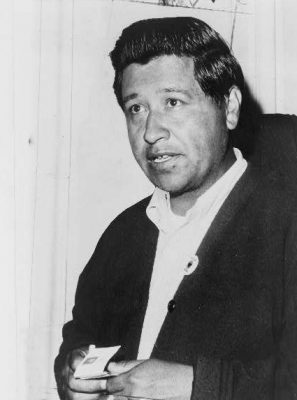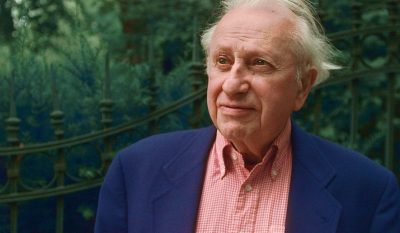
Chávez, circa 1966, courtesy of the Library of Congress.
The gift of Chávez’s crystal clear voice comes, for free to all, by virtue of a digitization project funded by the Chicago History Museum and the WFMT Radio Network. The project is called the Studs Terkel Radio Archive, and it covers 45 years of Terkel’s WFMT career (1952-1997).
Studs Terkel (1912-2008) is a kind of Chicago institution. I first heard of him and his work shortly after moving to Chicago in 1997, for my graduate work Loyola University Chicago’s History Department. The Department has always been strong on Chicago history—a reputation maintained today in the persons of Loyola Professors Timothy Gilfoyle and Elliott Gorn. Ted Karamanski has also contributed on this topic. When I arrived, however, that reputation was maintained by Paula Pfeffer, Susan Hirsch, Lewis Erenberg, and others.

Studs Terkel, circa 1997—as I first remember him.
What other voices are available in the Studs Terkel Radio Archive? And which will be of interest to intellectual historians? The answers: many, and plenty.
Staying with Latinx/Latino/Latina voices, Dolores Huerta was interviewed by Terkel in 1975. Unfortunately, the episode has not yet been digitized and uploaded.
In 1961 and 1962, Terkel interviewed James Baldwin. You can hear “Jimmy” Baldwin’s thoughtful, affected voice, circa September 1962, at this link. Terkel heaps praise on Baldwin in the intro, praising the latter’s probing questions of life and society. Terkel’s respect for Baldwin is clear.
Martin Luther King, Jr. was interviewed by Terkel in October 1964
. The main topic was King’s 1963 “I Have a Dream” speech. It appears the audio is forthcoming. While you wait for that, you can listen to Terkel talking with Ralph Ellison in 1970 (and a transcript is available!), or with Stokely Carmichael in 1968 (with Charlie Cobb and Courtland Cox)—in one of three interviews, where SNCC is discussed.
Other voices of interest, available now or forthcoming: Ravi Shankar (1961 interview), Marshall McLuhan (1966), Lily Tomlin (1988 and 1994), Woody Allen (1965), and on and on.
Explore the Terkel Archive. I think you’ll find it worth your time. And if the voice you need to hear isn’t yet available, bookmark the page for a future search. – TL

One Thought on this Post
S-USIH Comment Policy
We ask that those who participate in the discussions generated in the Comments section do so with the same decorum as they would in any other academic setting or context. Since the USIH bloggers write under our real names, we would prefer that our commenters also identify themselves by their real name. As our primary goal is to stimulate and engage in fruitful and productive discussion, ad hominem attacks (personal or professional), unnecessary insults, and/or mean-spiritedness have no place in the USIH Blog’s Comments section. Therefore, we reserve the right to remove any comments that contain any of the above and/or are not intended to further the discussion of the topic of the post. We welcome suggestions for corrections to any of our posts. As the official blog of the Society of US Intellectual History, we hope to foster a diverse community of scholars and readers who engage with one another in discussions of US intellectual history, broadly understood.
Tim,
Thanks for bringing this to wider attention. I was aware of Terkel, his fame having extended well beyond Chicago (and beyond radio), but have never heard him interview anyone, so I plan to check this out at some point.